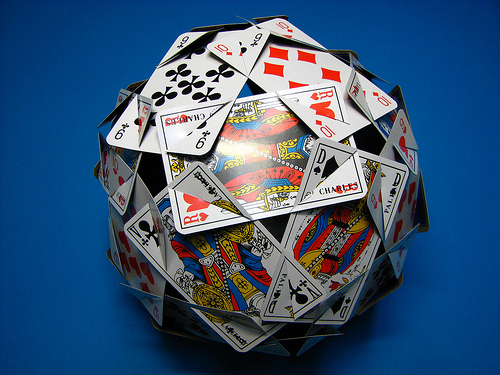Mobile patent litigation: A game with too many playing cards


Patent cases are now filed willy-nilly, and often with no intention of protecting innovation. They are being used as playing cards in a high-stakes game where one company hopes to create a stalemate with another. You drop your suit because of these patents I hold, and I'll drop mine in deference to your patents.
Google is front and center in the patent game with suits popping up all over. Its situation with Oracle looks worse every day, and its Android partners are entering the courts at an alarming rate. Android is claimed to infringe on patents held by several companies, and Google is running out of playing cards to stay in the game. The Motorola Mobility acquisition will get Google lots of new playing cards, but those cards didn't keep Motorola from getting sued by Apple so they might not keep Google out of court.
Microsoft has taken the approach of licensing its IP (patents) to Android partners, but as HTC has discovered that is not enough to avoid trouble. Apple and HTC are in patent litigation even though the latter pays Microsoft royalties on every Android product it produces. The license deal simply means Microsoft won't sue HTC, but it has no bearing on other companies (like Apple). HTC has licensed Microsoft's patent cards, but they are obviously not the right cards.
HTC recognized that the Microsoft IP wasn't going to help in the patent game with Apple, and recently got a few patents assigned to it by Google. With these new patents HTC immediately went on the offensive and filed suit against Apple on the basis of these patents. HTC obviously hopes it has enough cards in play to force Apple to agree to a stalemate, with both companies agreeing to leave each other in peace. The problem with the system currently is even if that happens, both companies are still free to go after other targets. The game will go on.
There are simply too many patents in the mobile space for any company to be protected from all others, so suits will continue to be thrown around. The suits are used as a tool to force companies to trade patent playing cards in the game. If a company successfully defends a patent or two in court against one foe, odds are new claims will be made that other patents are being infringed upon. With hundreds of thousands of patents in play, this game can be played forever. The winner will be who can afford to keep playing, not who is right. Make no mistake, this isn't about justice it's about outlasting the other players.
Image credit: Flickr User fdecomite
Related:
- By the numbers: Google, Motorola Mobility deal values hardware at ‘next to nothing’
- Google-Motorola Mobility would create interesting enterprise portfolio
- Will Microsoft pursue HTC or Nokia in reaction to Google-Motorola?
- At Motorola, a history of embracing, then rejecting, consumer spotlight
- Is Microsoft’s next move buying Nokia or RIM? Nah…
- Google’s Motorola acquisition: Is there a role for third party mobile operating systems?
- Google’s $12.5 billion Motorola Mobility bet: 6 reasons why it makes sense